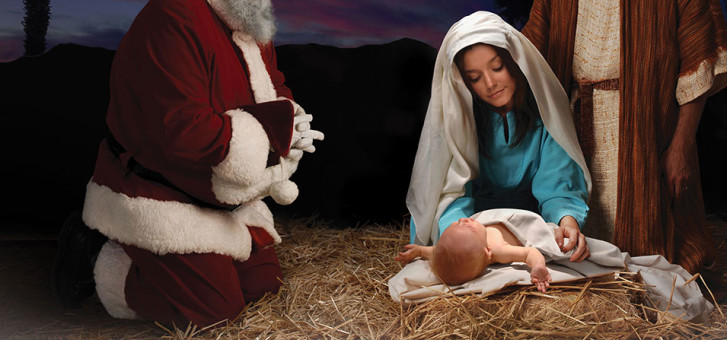"Shouldn't you be at church?” My wife’s colleague looked confused. He knew she was a Christian and that’s what Christians did for Christmas. “No,” she replied. “We don’t necessarily go to church on Christmas. I’m available to work Christmas morning.” It was the first Christmas we would celebrate alone as a married couple, not able to see either family because of our work schedules. A couple of hours' work on Christmas morning was a nice Christmas present for my wife’s bank account and we still managed to have a special lunch and a relaxing day.
However, there does seem to be some confusion among Christians, and especially Adventists, about how to celebrate Christmas and what it really means. After all, most people know that it's very unlikely that Jesus was actually born on December 25. So does Christmas really celebrate Jesus' birth? Should it?
Many Christians, like my wife’s colleague, celebrate Christmas by going to a mass or some kind of church program on Christmas Eve or Christmas morning. For some, this may be one of their only “compulsory" church attendances for the year.
Adventists seem to have three distinct attitudes about Christmas, although there are those who cross over a little.
There are those who say that Christmas is a pagan holiday, hijacked by the Roman Catholic church and now an ode to materialism and excess. And they are right. They tend to boycott Christmas altogether. No presents, no church services, just another day that happens to be a holiday. We’ll call them the boycotters.
Then there are those who embrace Christmas in all its glory. It’s the most wonderful time of the year! They go all out to decorate their homes and trees, they enjoy time with family and are very generous at this time of year. It’s all about the spirit of the season, giving and living and carolling. They recognise that Christmas is not really Jesus' birthday so they separate it from their faith. And they’re right. We’ll call them collaborators.
Then there are those who make their churches Christmas friendly. They use people’s generosity at this time of year to fundraise. They plan big events for their communities to remind people of the real "reason for the season". They have a Christmas tree with presents for the needy and a nativity scene at the front. Their Christmas programs are amazingly produced; seeker-friendly and sometimes leave you with a tear in your eye. They know that there has to be more to Christmas and it’s their job to tell the world. And they’re right. Call them hijackers.
All these groups are right. They approach Christmas differently but are all driven by good motives and the strength of their convictions.
We all fit mostly into one or another of these groups. Often it depends on our upbringing or the people we surround ourselves with. Different cultural groups tend to do things in a certain way.
However, let me suggest a fourth option. We need to reclaim Christmas. How do we do that? Let me explain by way of an example. A Christmas carol that brings back many fond memories of my mum’s Christmas programs is called “Christmas in the scrub”. It’s an Australian Christmas carol. A line in it says, “At Christmas time / the outback rings / all for the birth of God.” Now as long as Christmas has been around, it’s been celebrated in Europe and the medieval world during winter. There is no outback or beach picnic. But here in the southern hemisphere we have a strange mix. Santa wearing a heavy woollen coat with board shorts. The sleigh pulled by boomers (kangaroos). Christmas lunch with gluten steaks, roasted veggies and gravy along with macadamia, mango and avocado salads, summer fruits and barbecues on the beach. We borrow elements of Christmas tradition but insert our own to make it more practical to our needs.
This kind of subversion and substitution is something that Jesus practised during His ministry. Probably the best example I can think of was at the Passover meal. He took the traditional elements of the wine and unleavened bread and imbued them with new meaning. “Do this in remembrance of me.” Passover was a Jewish celebration, filled with meaning and ritual but Jesus reinterpreted it for His purpose. He reclaimed it for His kingdom.
You might be asking what this has to do with how we celebrate Christmas? Well, we need to use Christmas to make an impact in the world. There should be nothing wrong with a Christian celebration or holiday. After all, God gave the Jews plenty of events to celebrate and remember Him by (see Numbers 28 and 29). So let's reclaim Christmas from the culture. Revolutionise it and see if we can flip it upside down. Not sit out on the sidelines. Not get sucked into the materialism or the individualism but take the good elements and fill them with Christ; take old traditions and give them new twists and meanings.
The key is to approach it with intentionality. We are called to do everything for the glory of God (1 Corinthians 10:31). So why not how we celebrate Christmas?
Here are some practical things we can do:
1. Use the momentum of Christmas. People may quibble over whether Christmas is actually Christ’s birthday or if it comes from a pagan celebration but Christ’s name is spoken more around Christmas time in the secular world than at any other time, bar Easter. Christ said, “And I, when I am lifted up from the earth, will draw all people to myself" (John 12:32). So use that momentum. Neighbours, colleagues or friends might be more open to talking about Jesus at this time of year than at any other. If they bring up His name, ask what they think is the “reason for the season". We shouldn’t be afraid. Although it can have the opposite effect (unless we’re very careful) of leading us into a lengthy explanation of why we don’t celebrate Christmas because of this and that. If they don’t bring it up, find creative ways to work Christ into the conversation. Talk about what He means to you and what His coming to this earth really means in your life today!
2. Be generous. Don’t expect gifts but give them. Buy your neighbours gifts or give them a card with a nice message. It might be a good way to break the ice and meet new people. Go around your neighbourhood and offer to help people with gardening or other chores in the name of Christmas giving. Do random acts of kindness for strangers who will be more receptive at this time of year.
3. Run a Christmas program for the community. Lots of churches do this very well. They hold their yearly Christmas carols or sacred concert at a community park, hall or school and invite the neighbourhood. As brilliant as a program is, it can be intimidating to walk into a church. Go to your community. Run things with them. Maybe as a church you can think of other creative things to do, like carolling in nursing homes or having a trash and treasure day where stuff is free.
4. Open up your home. Throw a Christmas party. Invite friends or neighbours over. Find people in your community who have to work at Christmas and will not be spending time with family. It’s terrible to be alone at Christmas so open up your home. Enjoy eating and laughing together. And pray. Pray that you can share Jesus with them before they arrive, and when they do arrive, pray for them and the meal. Just a simple Christmas grace.
5. Buy people charitable gifts. Buy a goat or a sewing machine for someone in Nepal or Uganda and do this for others, especially if you can’t think of a meaningful gift for them. Encourage them to pass it on so the generosity continues.
Christmas is a day like any other but it can be a great opportunity and it must be turned toward Christ, whichever camp we fall into. As Ellen White says, “There is no divine sanctity resting upon the twenty-fifth of December; and it is not pleasing to God that anything that concerns the salvation of men through the infinite sacrifice made for them, should be so sadly perverted from its professed design. Christ should be the supreme object; but as Christmas has been observed, the glory is turned from Him to mortal man, whose sinful, defective character made it necessary for Him to come to our world.”
I’m sure you can think of other ways to reclaim Christmas. Make it, like the angels proclaimed, a time of peace and goodwill. Be bold and courageous. Jesus loved to eat and drink with people, so much so he was called a glutton and a drunkard (Matthew 11:19). He liked to celebrate. Celebrations are where friendships are forged. So be like Jesus this Christmas. Subvert, be intentional and reclaim Christmas. And rediscover the real reason for the season.
Jarrod Stackelroth is an associate editor of Adventist Record.







